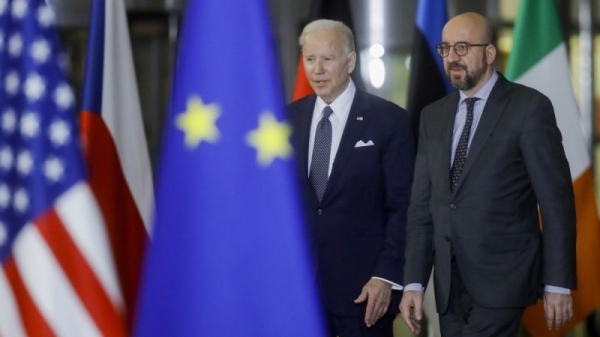EU formally approves extraordinary, one time satellite launch from US territory

The European Union on Tuesday (19 March) agreed on a deal that will see EU Galileo satellites launched from US territory in a last-ditch effort and extraordinary measure to save their space programme.
The launch of the next batch of navigation Galileo satellites, dubbed the ‘European GPS’, is scheduled to occur before the summer to avoid endangering the programme and comes after two years of delays, ending the saga of Europeans losing independent access to space.
EU countries decided to launch from US soil with Elon Musk’s American private company SpaceX based on an international agreement with Washington setting strict security requirements, reported by Euractiv earlier this month.
The announcement comes as a blow to the bloc’s will to boost its ‘strategic autonomy’ and avoid dependence on third partners in strategic matters—such as space—and adds to the pressure on the European manufacturers of Ariane 6 to provide a more ‘sovereign’ solution to a long-term challenge.
It also highlights the EU’s struggle to secure independent access to space as the bloc seeks to become a bigger power in the contested zone, where major global players and competitors such as China, Russia and India assert their presence and own rules.
Meeting a temporary need
Time is of the essence to ensure the continuity of a navigation service used by billions of citizens and the military in Europe and beyond the bloc’s borders.
Russia’s payback for EU sanctions has left the bloc unable to use its Soyuz rockets, and delays in the production of the EU-manufactured Ariane6 launcher left the European satellites stranded for years.
The European rocket’s maiden flight is planned for the summer.
In the meantime, and to plug the crucial gap, the Commission and EU governments had no other option but to organise a launch from the US to save the programme, the agreement states.
“It is important that the choice of a US launcher meets a temporary need due to the unavailability of Ariane 6, which we hope will be as short as possible, with a flight in June and July”, one EU diplomat told Euractiv.
However, it is also important “to have trust in the launcher and stay vigilant at the same time,” they added, in a veiled reference to the tightly knit agreement overseeing the exchange of information, presence on the launchpad, debris collection, and accountability in case of an incident.
“Being able to send our satellites into space is crucial. We needed to deploy two new Galileo satellites, but we don’t have any European launchers available (…) that’s why I support SpaceX sending European satellites from American soil,” Christophe Grudler (Renew, France), a shadow rapporteur for the space programme, told Euractiv.
“But this should be the exception,” he added.
“So no, this is not a model to be replicated – it is an exception,” he said when asked whether this agreement could be used as a model for future cooperation.
Internal Market Commissioner Thierry Breton restated his ambition to develop a “European launcher policy within an EU framework” earlier in the year to aggregate the demand in a move to give the industry clear guidelines before manufacturing and also boost competition in the business – a proposal that is likely to stir debate.
A proposal is expected before 2028, he said.
Grudler said “the rule ” to launch from European soil by European players is the “best guarantee of our security and independence”.
“If tomorrow the Americans no longer wanted to launch our satellites, we would have a big problem,” he highlighted.
IRIS² launch with a European asset
The European Commission plans the launch of a new constellation of satellites offering secured communication channels, IRIS².
The manufacturing and operating consortium will be announced in the coming weeks and will be made up of Airbus and Thales Alenia Space, with private operators.
IRIS² will be launched by EU-made Ariane 6, Grudler said: “With Ariane 6, which will be operational by this summer, and then Vega, we will have everything we need to launch IRIS²”.
Read more with Euractiv




